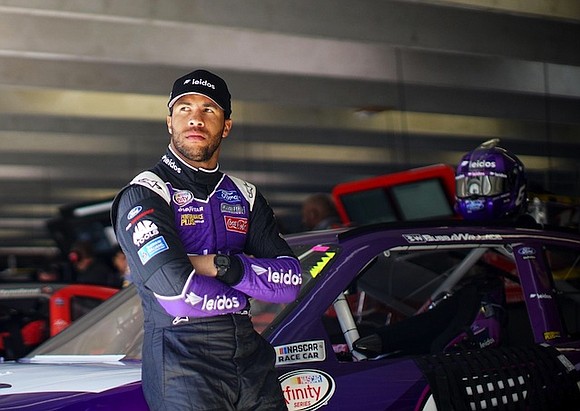Darrell 'Bubba' Wallace: How Lewis Hamilton inspired NASCAR star
CNN/Stylemagazine.com Newswire | 3/14/2018, 6:58 a.m.
By Bianca Britton, and Don Riddell CNN
(CNN) -- Lewis Hamilton made his Formula One debut in 2007 and a year later he became the sport's youngest champion at the age of 23.
But Hamilton wasn't just breaking records. As F1's first black driver, Hamilton was also breaking down barriers -- and inspiring young up and coming drivers like NASCAR's Darrell "Bubba" Wallace.
"There was nobody to identify with," Wallace tells CNN Sport's Don Riddell. "I remember always playing the F1 2010-11 game on Xbox and I'd pick Lewis Hamilton every time. I became a huge fan of his and see what he's going through. He's a huge role model of mine."
Back in 2010, Wallace didn't know it, but he was also destined to make motorsport history.
The first full-time, African-American NASCAR driver since the early 1970s, Wallace stole some of the spotlight from Daytona 500 winner Austin Dillon last month after he finished second.
It was the best performance by an African-American driver in the race's history.
Much to Wallace's surprise, before he took to the track his hero wished him luck.
"Hey @BubbaWallace! Wishing you the absolute best today in your race," Hamilton tweeted. "Smash it!!"
"I was just like freaking out ... To see that tweet, to see that kind of respect he had given out to me was unreal," the 24-year-old from Alabama says.
'Once you put the helmet on, we're all the same'
Motorsport -- in contrast to the NFL, the NBA and baseball -- and NASCAR has tended to be dominated by white drivers.
Back in the the '50s and '60s, Wendell Scott was a pioneer for black drivers, pursuing his racing passion in the face of death threats, sabotage from other drivers, and officials who initially awarded a win to a white driver who had finished two laps behind.
Wallace says that while being an African-American driver is a major part of his identity, it was never his motivation.
"I never paid attention to that," Wallace says. "I've always said once you put the helmet on you don't know who's who -- we are all the same, we're all drivers at the end of the day.
"I just kept working hard, not so much to prove people that I belong, just to win."
Inspiring younger African-Americans
While he never focused on his ethnic background as he made his way up through the ranks, Wallace is aware of the impact he's having on younger drivers. Some have already approached Wallace to tell him he's become a role model to them.
"He was a mixed kid just like me and that was special to be able to encounter with," he says. "I think it's a chance for me to show my likeness and show my competitive nature, show my emotions and how I am each and every day."
But following the 2018 Daytona 500, Wallace carries the new only-black-driver title with pride with the pinned tweet on his Twitter account as proof:
"There is only one driver from an African American background at the top level of our sport.. I am the one. You're not going to stop hearing about 'the black driver' for years. Embrace it, accept it and enjoy the journey."
And while NASCAR isn't traditionally known for diversity, where for decades -- up until 2015 -- it was not uncommon to see the Confederate flag waved on the track, the sport has been trying to turn that around in recent years.
Drive for Diversity
In 2009 it created the Drive for Diversity program in an attempt to give talented drivers from diverse backgrounds an opportunity to compete. It provides training, support and equipment to those who don't always fit the traditional NASCAR image.
It's that diversity program that Wallace in part has to thank for his success. He says it means the world to him to have been given a shot at racing.
"I'm very thankful for what NASCAR has done to be able to move that initiative and give the drivers of a different background, a different demographic a chance that don't necessarily have the funding, don't necessarily have everything they need all in one package to get to the next level."
He says while his goals include winning a lot of races and championships, he has his eyes on something even bigger: The Hall of Fame.
"Not many (race car drivers) say they want to be in The Hall of Fame, I'd love to be there one day -- and through wherever this journey takes me, if this is my last year in NASCAR, or if this is the beginning -- which I believe it is -- then I want to do everything I can so when I'm done I can look back and say there's not much more I could have done."






